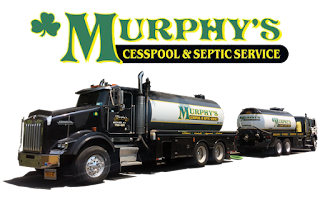Cesspool Professional Services located in Suffolk County Long Island, New York
Cesspool Service
Locating and servicing your system! Pumping, aerating, and chemical treatment of your cesspool is essential to extending its lifespan. Murphy's Cesspool & Septic Service has qualified professional technicians that can diagnose, locate and service all types of drainage systems.
Preventative Cesspool Maintenance
Managing what is placed in your system is the first line of defense to maintain a cesspool or septic system. Like the human digestive system, there is good bacteria that is necessary to break down solids and waste. When we place certain household chemicals in the system, we can harm a cesspool system as opposed to helping clear it.
Chemicals used in a home such as, ammonia or antibacterial cleansers will kill the good bacteria preventing a sewage system to break down solid matter. Diapers, paper towels, baby wipes, and paper towels are not designed to pass naturally through a septic system. Hard bonded paper is not able to break down as quickly as bathroom tissue paper. This may create a blockage making a regular maintenance necessary more frequently. Cooking grease is another cause of a blockage because it solidifies as it cools and adheres to septic systems similar to the way cholesterol clogs the veins and arteries of a human being in the blood. Avoid putting solid matter or vegetation in your system. This can also cause a blockage within the entire septic system causing a back-up. Although powdered laundry detergent is cheaper in initial cost, the long-term effects of the powder can cause clogging because it forms a clay like substance that clogs a septic system. Therefore, use only liquid detergents if possible although it is costly. Laundry is something that is done regularly, so good practice will maintain the integrity of a healthy cesspool. When running multiple water spots at once it can cause an initial back-up in a septic system. Cesspool & septic systems have limited diameter capacity to pass liquids and solids alike. Test Your Cesspool System Levels
Septic systems are designed to separate liquid and store the solid waste. They need to be maintained periodically preventing overflows or back-ups. A simple test may be performed using a stick long enough to touch the bottom of your cesspool. When dipped and examined, the sludge level should be one-third or less of the tank height. If the stick shows a higher level than one-third of the cesspool, you will need to have it serviced.
Special Notes On Cesspool Lagoons
Very rarely Suffolk County areas may have a cesspool lagoon. This is located above the ground. This form of septic system appears primarily in areas where the soil cannot support a drain field and municipal sewer systems aren’t available. Waste water is pumped into a shallow lagoon where sunlight and oxygen decompose the waste quickly. Murphy’s Cesspool & Septic Service would like to mention a few steps to follow when maintaining a cesspool lagoon in Suffolk County Long Island. Maintenance It may become necessary to dredge the lagoon using a backhoe if the cesspool Lagoon level approaches the top. Shrubs growing in the cesspool lagoon clog the system hindering the aeration process. It’s important to remove any plant life or leaves which appear in the lagoon while they’re small, or you will eventually have to use a backhoe to maintain your cesspool system. Safety Cesspool lagoons are located outdoors and can be near where children play. Murphy’s Cesspool & Septic Service suggest adding fencing to prevent children or animals from falling in the cesspool lagoon. Make the enclosure large enough to permit mowing. Outdoor cesspool lagoons will need dunks added once per year. These are small disks help prevent the spread of mosquitoes.
Please contact Murphy's Cesspool & Septic Tank Service today for all your cesspool & sanitary needs.




Comments
Post a Comment